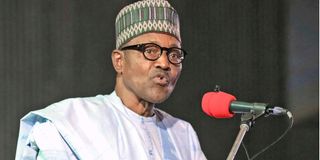Buhari condemns ‘sex for grades’ in Nigerian universities

Nigeria President Muhammadu Buhari speaks at a past event in Abuja. He says cases of sexual harassment in the country's universities are alarming.
What you need to know:
- Nigeria President Muhammadu Buhari says sexual harassment of female university students in the country have reached alarming levels.
- Nigeria is one of the countries with the highest cases of sexual violence against university students in the world.
Nigeria is on the spotlight following revelations by the country’s president that sexual harassment of female university students have reached alarming levels.
President Muhammadu Buhari’s revelation last week, puts Nigeria into sharp focus over its human rights violation against girls and women. Gender and human rights activists are now calling for stringent measures to curb the menace.
The Nigerian President, according to Reuters, singled out the "sex for grades", which he said is part of corrupt practices in the universities that authorities are investigating.
Abuse of power
Buhari told an anti-corruption summit in Abuja that the government was concerned with the ongoing sexual harassment of female students, terming it an abuse of power in educational institutions.
"There is sorting or cash for marks/grades, sex for marks, sex for grade alterations, examination malpractice, and so on. Sexual harassment has assumed an alarming proportion," Buhari reportedly told the gathering.
The President noted other forms of corruption at universities included lecturers writing dissertations for students at a fee, payment of salaries to non-existent workers and lecturers taking up full-time jobs in more than one academic institution.
Sexually harassed
Nigeria is one of the countries with the highest cases of sexual violence against university students in the world.
A survey conducted by the World Bank Group in 2018 showed that 70 per cent of female graduates from Nigerian tertiary institutions have been sexually harassed in school, with the main perpetrators being classmates or lecturers.
Another research by Ford Foundation, released in 2018, indicated that sexual and gender-based violence (SGBV) has continued to thrive in Nigeria because victims struggle to access justice.
The foundation, in the report, observed that women and girls were the most vulnerable to this menace as they have little protection and added that this trend has made Nigeria the 9th most dangerous place to be as a woman.
In 2015, the Nigerian Feminist Forum (NFF), protested over the rising cases of rape in tertiary institutions across the country.
NFF said it was dismayed and alarmed by what appeared to be an overwhelming rise in reported cases of sexual assault and rape of female university students by male members of the academic staff and students across university campuses in Nigeria.
Public backlash
The organisation decried the rising cases of rape on campuses and added that there were several other cases that went unreported because victims feared stigmatisation.
“The statement said the majority of cases of sexual violence against female university students in Nigeria go unreported for various reasons associated with victim shaming, stigma, character assassination, public backlash and limited access to justice, among others,” NFF said in a statement.
The feminist group added that in many cases, female students who reported such cases were subsequently targeted for reprisal attacks by thugs, cultists or university teachers.
The group noted the growing abuse of female university students is fuelled by lack of consistent and clear policy by university governing bodies and school authorities concerning sexual harassment, sexual assault and rape.
Sexual offence
To help end the problem, the group urged the academic staff union of universities to adopt and enforce a comprehensive sexual harassment policy for its members. It also called for the penalizing and delisting of any of its members convicted of an act of sexual offence.
Since last year, there has been heightened online protest against sexual violence and harassment against women in Nigeria’s social media. And even though some progress has been made in the fight against sexual violence, gender and human rights activists have been protesting that most victims do not get justice and perpetrators often suffer no consequences.
Data provided by Rape, Abuse and Incest National Network (RAINN), America’s largest anti-sexual violence organisation, indicates that 13 per cent of students, worldwide, experience rape or sexual assault through physical force, violence, or incapacitation.
The research also shows among graduate and professional students, 9.7 per cent of females and 2.5 per cent of males experience rape or sexual assault through physical force, violence, or incapacitation.





